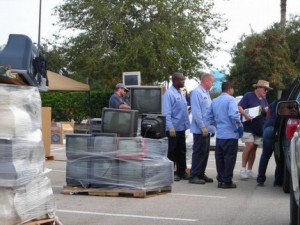When you are about to buy a new appliance item, there pop ups a question: what will you do with your old one? It is one thing if you are buying something that you never had, but it is a completely different – if you are going to replace your out-of-date fridge, for example. There are several options in this case: to send to a disposal, you bring it to your summer house, give it to the poor, or recycle.
Recycling has become quite fashionable these days. Definitely there are people who do this just out of environmental situation concerns, however, others may do it unconsciously and just because their neighbors do that. On the other hand whatever the reasons are, it is a good thing to undertake. And it is not in terms of waste recycling only, household appliances can also be subjected to this process. You can recycle literally any household item you have: cooling equipment, electronics, lightning equipment, etc.
Most municipalities will pick up your old refrigerator, freezer or air conditioner with the bulk trash pick-up (you must call the city to arrange a pick-up). By law, the city must must dispose of refrigerants, PCBs and mercury properly. But first, contact your utility to see if there is a rebate or bounty program in your area.
Several major electronics manufacturers have programs in place to accept their old hardware, usually as a trade-in upon purchase of a new unit. They are joined by retail stores, including Staples, Best Buy, Office Depot and Wal-Mart, who have programs to collect appliances such as computers, monitors, laptops, printers, faxes and all-in-ones for recycling in accordance with environmental laws.
Find a local e-waste recycling or donation program by visiting EPA’s eCycling page.
Many towns and cities offer recycling opportunities for CFLs at local recycling centers or transfer stations. State requirements and recycling opportunities vary. To find out what programs are available in your state or region, go to http://www.epa.gov/bulbrecycling.
Your utility may even pay you to get rid of inefficient appliances. These programs usually involve an incentive on the order of $35 for the collection of old units, either in the form of cash or a rebate towards an ENERGY STAR replacement. A third party contractor that works with the utility will either come to you and pick up the appliance, or hold a turn-in event where you drop it of. Existing programs predominantly target old refrigerators; a few programs also offer a rebate for room air conditioners. Contractors ensure that the old units are disposed properly.
Filed under: Recycling | Tagged: air conditioner, appliances, desposal, Recycling, refregirator, utility | Leave a comment »


